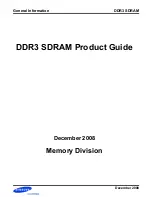
Errata
Specification Update
27
AA33.
Using 2M/4M Pages When A20M# Is Asserted May Result in Incorrect
Address Translations
Problem:
An external A20M# pin if enabled forces address bit 20 to be masked (forced
to zero) to emulates real-address mode address wraparound at 1 megabyte.
However, if all of the following conditions are met, address bit 20 may not be
masked:
•
paging is enabled
•
a linear address has bit 20 set
•
the address references a large page
•
A20M# is enabled
Implication:
When A20M# is enabled and an address references a large page the resulting
translated physical address may be incorrect. This erratum has not been
observed with any commercially available operating system.
Workaround:
Operating systems should not allow A20M# to be enabled if the masking of
address bit 20 could be applied to an address that references a large page.
A20M# is normally only used with the first megabyte of memory.
Status:
For the steppings affected, see the
Summary Tables of Changes
.
AA34.
Writing Shared Unaligned Data that Crosses a Cache Line without
Proper Semaphores or Barriers May Expose a Memory Ordering Issue
Problem:
Software which is written so that multiple agents can modify the same shared
unaligned memory location at the same time may experience a memory
ordering issue if multiple loads access this shared data shortly thereafter.
Exposure to this problem requires the use of a data write which spans a
cache line boundary.
Implication:
This erratum may cause loads to be observed out of order. Intel has not
observed this erratum with any commercially available software or system.
Workaround:
Software should ensure at least one of the following is true when modifying
shared data by multiple agents:
•
The shared data is aligned
•
Proper semaphores or barriers are used in order to prevent concurrent data
accesses
Status:
For the steppings affected, see the
Summary Tables of Changes
.








































